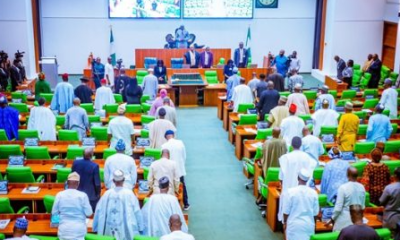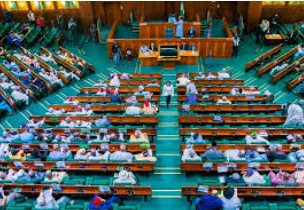Covid-19
Detectable flaws of Control of Infectious Diseases Bill 2020
Published
6 years agoon
By
Olu Emmanuel
The legislation on the Control of Infectious Diseases Bill 2020 by the House of Representatives being sponsored by Speaker of the Ninth House of Representatives, Rt. Hon Femi Gbajabiamila, and others, has continued to generate caustic criticisms and condemnations from stakeholders in the Nigerians project. Sociological and legal evaluations identify the bill as anti-citizens, undemocratic, negation of human rights, rule of law and dictatorial.
Legal verdicts detected several flaws that make the disease control bill impracticable or dehumanizing to Nigerian citizens. The detected inadequacies and repugnant provisions were highlighted to include the following.
Section 1 of the bill undergoing legislation in the House concentrates excessive powers on the Director General of the National Centre for Disease Control (NCDC).
The associated constitutional questions in the Bill and serious concerns to the legal community were indicated as follows:
The implementation of the Bill centralized powers on the NCDC DG: making the DG overly powerful. This gives impetus to dictatorship.
Legal opinions argue that in Section 1:
The Bill totally neglected the federal system in Nigeria – the devolution of powers of the government between the federal and the state governments, which are the major federating units in Nigeria’s federalism.
Section 3 (2b), 8 and 9 empowers the DG or his appointed agents to declare any gathering, religious, cultural, social or otherwise, on mere suspicion of the presence of infectious disease criminal. They contended that such discretionary absolutism power is not only abusive but takes away the Constitutional Powers of the Courts to determine the criminality of an action or otherwise.
Section 6 provides for coercive testing on mere suspicion of a person, refusal attracts legal sanctions including a conviction. Legal opinions are apprehensive that this provision is amenable to abuse by an absolutist power administrator without an option of legal challenge to such abuse.
Section 8 clearly erases confidentiality and privacy rights of patients in their contacts with personal Physicians. Legal opinions argue against exposing a citizen to inhumane treatment of publishing his/her medical history without his/her consent, whose refusal attracts a conviction without trial in the Court of Law.
Legal opinions detest that Section 12 empowers the DG on a mere suspicion to prohibit the burial of a deceased by his/her family, noting that this violates the Citizens right to human dignity.
It was noted that Section13 empowers the DG to order any suspected case to be detained or isolated at his absolute pleasure without any clinical examination, thus, violating the person’s fundamental right to freedom of movement an order of a competent Court.
It was pointed out that Section 15 empowers the DG just by notification to take over anybody’s premises and declare it an isolation center without the consent and permission of the owner. This excessive power denies right to property which may be used against perceived political enemies or opposition party members on the guise that their property is declared an isolation Center without recourse to a Court of law.
It was identified that Section16 is a strong instrument against the Church, Mosque and other religious affinities. Thus, if in the opinion of the DG any building is designated overcrowded, he can order dispersing of the crowd; anyone in such building shall be convicted of an offence without trial in a competent Court of law.
Also, Subsection 7 of Section16 provides that once the owner of a building receives notice of dispersal, the notice takes immediate effect irrespective of pending appeal at the office of the Minister of health. This was argued to violate citizens right to fair hearing.
It was further stated that the Bill reassigned powers of the judiciary to the Executive. This was said to be absolute arbitrary powers. Such unconstitutional powers were cited in some sections like Section 19, beside others.
The legal community protested that Section 57 (1) of the Bill authorizes arrest without warrant on almost every issue based on mere suspicion and private opinion of the NCDC DG, health officers and police officers; arguing that the provision empowers the police to arrest and detain based on suspicion without proof of guilt. The victim is, therefore, punished before proper investigation or ascertaining chances of innocence.
The powers of the executive officers to take extra-judicial decisions to the detriments of citizen’s constitutional rights to freedom of movement and dignity of human person are being questioned.
Subsection 8 raises question of impunity to the measures referred to in Subsection 7 which includes the entry into a place without warrant and the use of such force as maybe necessary.
All public debate postulates the discontinuation of legislation on the disease control bill which further raises suspicion of foreign influence or sponsorship.
You may like


Reps endorses State of Emergency in Rivers


You Can’t Islamize Nigeria’ – Heated clash amongst Reps Members over proposed Shariah Law Bill


House of Representatives advances bill to arm FRSC officers


JUST IN : ADC Rep defects to APC


House of Reps member Dogonyaro is dead


$500k Otedola Bribe: Supreme Court affirms ex-lawmaker, Farouk Lawan’s 5yrs jail term
Trending

 Health5 days ago
Health5 days agoDeclassified CIA memo explored concealing mind-control drugs in vaccines

 Entertainment6 days ago
Entertainment6 days agoSimi addresses resurfaced 2012 tweets amid online backlash

 Crime5 days ago
Crime5 days agoSenior police officers faces retirement after Disu’s appointment as acting IGP

 Education7 days ago
Education7 days agoPeter Obi urges JAMB to address registration challenges ahead of exams

 Health7 days ago
Health7 days agoNAFDAC issues alert on suspected revalidated SMA Gold infant formula

 Comments and Issues6 days ago
Comments and Issues6 days ago20 Critical Fixes to Save Nigeria’s Democracy from Electoral Fraud

 Football6 days ago
Football6 days agoMartínez ruled out of Everton clash with calf injury

 Latest6 days ago
Latest6 days agoICPC yet to respond to El-Rufai’s bail request as arraignment date looms

